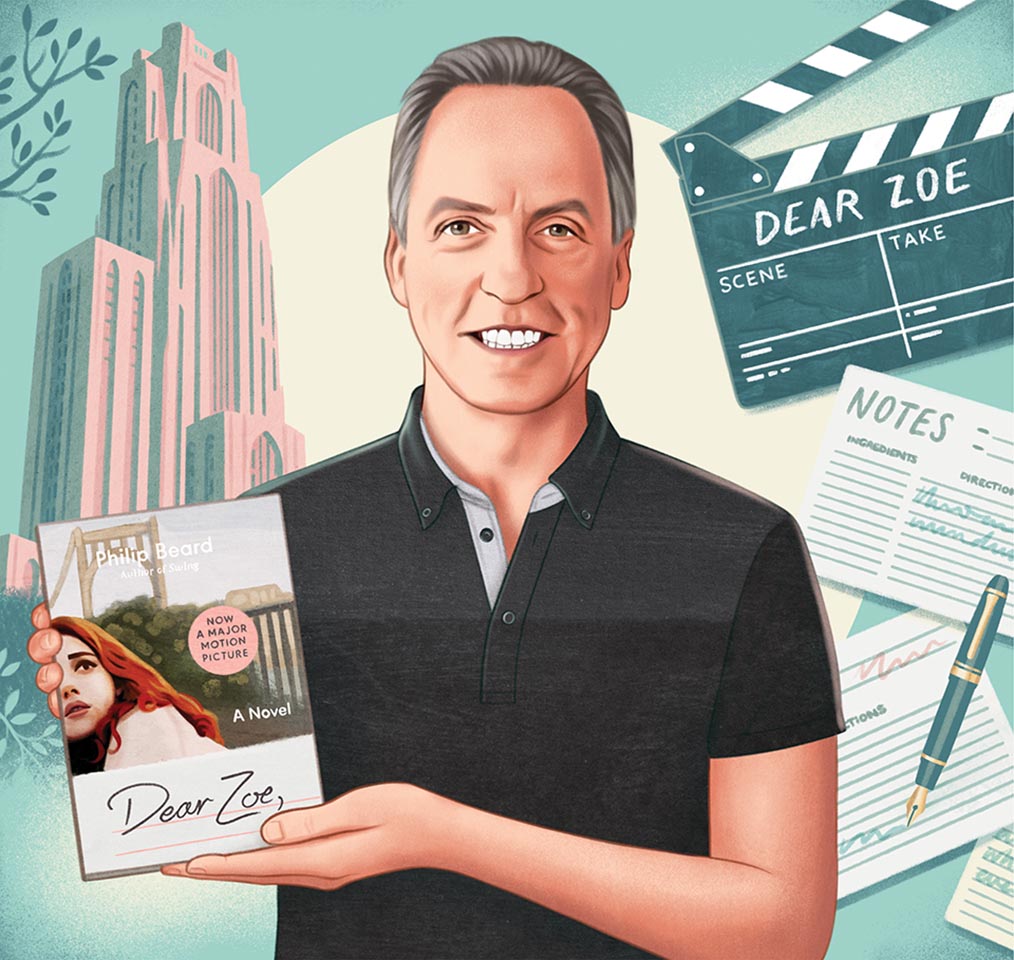Philip Beard ’85 has balanced a law career with writing novels.
One afternoon in 1987, Philip Beard ’85 sat in the University of Pittsburgh’s Cathedral of Learning, a 42-story skyscraper at the center of campus. He was having a conversation with acclaimed southern writer and Pitt professor Lewis “Buddy” Nordan about the writing process. Beard was in Nordan’s graduate fiction writing course that semester as a law school elective.
“How do I know if I’m a writer?” Beard asked Nordan.
“Writing isn’t something you choose,” Nordan replied. “It’s something that chooses you. And you’ll either write or you won’t.”
For 13 years after that moment, Beard didn’t write.
Then, in 2000, he did.

His first published novel, Dear Zoe, was released in 2005, formally beginning Beard’s writing career. The book follows the story of a teen girl who loses her sister in a hit-and-run on 9/11. Looking for closure, she writes letters to her sister that demonstrate the book’s themes of guilt, troubled family relationships, and adolescence.
Now, Beard can count a film among his accomplishments — in late 2022, the book was adapted into a film starring Stranger Things’ Sadie Sink.
Beard had always been a “voracious reader,” but it wasn’t until Professor Frederick Busch’s Living Writers course that he seriously considered writing. Each week, as Busch brought professional authors, editors, and publishers before the class, the English major sat in awe. “[Busch was] giving us a taste of the entire industry, and it was really eye-opening,” Beard says.
Though Beard enjoyed his English courses, he ultimately wanted a law career. He attended Pitt Law, where he met his soon-to- be-mentor Nordan and developed a passion for writing fiction. After graduation, Beard started his contract law career and helped raise his three daughters, including his step- daughter, Cali. When he started writing again, in 2000, he imagined her voice as he created Tess, the female protagonist in Dear Zoe. “I got that pull that Buddy Nordan said I would feel,” he remembers.
He looked around his office at the law firm, feeling out of place and dissatisfied with his day-to-day life. He and his wife discussed him leaving law for about a year. One day they were having a meal in their favorite Chinese restaurant. As they rehashed the details, the waitress brought them their fortune cookies. Beard’s read: “You are a lover of words. Someday, you will write a book.” He kept that fortune tacked to his refrigerator for the next 20 years, as he wrote and published three novels, including Dear Zoe (Viking, 2005), Lost in the Garden (Viking, 2006), and Swing (Van Buren, 2015).
Beard eventually went back to practicing law part time, but now he largely does it to fund his writing time. “I realize what a gift it is to be able to do something part-time that can actually pay my bills, leaving time for creative stuff,” he reflects.
The Best Advice He’s Ever Received
From the New York Times’ “Modern Love” editor Daniel Jones (Beard’s high school classmate): “Writing a novel is taking a road trip in your car at night. You can’t see where you’re going, but you’re getting somewhere. Every day you just see as far as the headlights, you just write as far as you can see, and keep stacking up pages.”
How to Develop a Plot
“I think that to write a novel, you don’t want to know in advance what’s going to happen, but you have to have something in mind with enough weight to carry you forward,” Beard says. When inspiration strikes, he writes thoughts in a recipe card notebook that he keeps on hand. When the notes start speaking to one another, he knows there is weight.
“I’ve never felt that the words just flowed,” Beard says. “I’m a very deliberate writer. I’m a ruthless editor.”
On Writing About Tragedy
Dear Zoe includes several tragic events that are overshadowed by the events of 9/11. “I was like, ‘How do you write about this tiny little tragedy in a world where buildings can fold into the sidewalk?’ And it wasn’t until I struggled with that for a month or two that I realized that’s exactly how my narrator, Tess, would feel. She would feel as if her tragedy had somehow been silenced by what happened elsewhere that day.
“That’s when I realized I had to make it a part of the story, but work hard to keep it in the background as something that was just sort of whispering but not dominating the page.”
